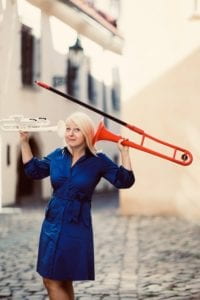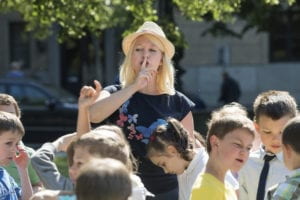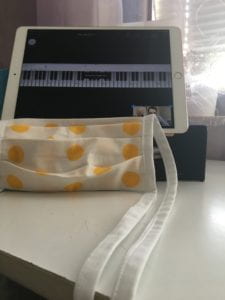 Klára Boudalová is a teaching and performing artist, scriptwriter, and concert presenter. She teaches Foundations of Music Education at NYU Prague, a course with a syllabus she describes as “practical” and which involves community engagement because she always wants “her students to make a difference.” This year, she had planned for the students in her course to work with children in Prague on a musical project.
Klára Boudalová is a teaching and performing artist, scriptwriter, and concert presenter. She teaches Foundations of Music Education at NYU Prague, a course with a syllabus she describes as “practical” and which involves community engagement because she always wants “her students to make a difference.” This year, she had planned for the students in her course to work with children in Prague on a musical project.
Klára’s focus on connecting students with the Prague community through music is consistent with her own work. She is an accomplished musician and music educator. For the past twelve years, she has worked for The Czech Philharmonic Orchestra as a creative author of education and outreach programs, working mostly with school groups and families (chamber and orchestral concerts, workshop series), young aspiring artists (masterclasses and discussions) and music teachers (leading a professional development project Music for Schools).
As an educator, Klára has designed outreach programs for many professional and student orchestras. She has also written a series of twelve audiobooks entitled “Don’t be Afraid of the Classics” which became a best-selling, award-winning, nationwide classroom music teaching tool in the Czech Republic. An early music soprano and a lover of swing and Irish folk music, at NYU Prague Klára helps students find their own passions for and styles within the field of music education.
 For her class this year, instead of being able to work together with children in Prague on a project, NYU Prague students are now designing their own projects. According to Klára, “Each student was asked to connect with their local community – find kids who are bored at home or reach out to former teachers – to find something beneficial that can be done through music.” In redesigning the course, she realised that there are currently many people who could benefit from support and so she asked students to design projects relevant to the COVID-19 situation in which children must stay home. The students were encouraged to use their creativity when designing their projects.
For her class this year, instead of being able to work together with children in Prague on a project, NYU Prague students are now designing their own projects. According to Klára, “Each student was asked to connect with their local community – find kids who are bored at home or reach out to former teachers – to find something beneficial that can be done through music.” In redesigning the course, she realised that there are currently many people who could benefit from support and so she asked students to design projects relevant to the COVID-19 situation in which children must stay home. The students were encouraged to use their creativity when designing their projects.
The Foundations of Music class is meeting twice a week at 9:00 – 10:30 pm local time for Klára, which works only because Prague’s cultural institutions are closed so she is not performing in concerts. But with students now joining from China, Alaska, and everywhere in between, this was the best time. Teaching remotely to a global cohort means that “the students have a lot more academic responsibility now,” according to Klára. “Originally they would have developed their projects with me present, guiding them in their lessons, but now they have to respond on their own. I have one-on-one mentoring sessions with them to track their process.” She has been impressed with how well the students are doing on their own.
 The students are also actively sharing with one another and with Klára in the class meetings and are creatively approaching their local musical engagement. Students began by exploring tools to facilitate virtual music education, such as online learning apps and videos. They are also generating their own ideas. For example, teaching children how to make homemade instruments out of pots or other materials they would find at home and then composing music with their home-made instruments. Klára is pleased with the interactive aspect of the class, despite not being able to meet in person. “We are all tracking each others’ research and progress through a shared google drive folder with videos that the students are making. Everyone is recording videos and reacting.” Klára and her students are creatively making the most of a challenging time.
The students are also actively sharing with one another and with Klára in the class meetings and are creatively approaching their local musical engagement. Students began by exploring tools to facilitate virtual music education, such as online learning apps and videos. They are also generating their own ideas. For example, teaching children how to make homemade instruments out of pots or other materials they would find at home and then composing music with their home-made instruments. Klára is pleased with the interactive aspect of the class, despite not being able to meet in person. “We are all tracking each others’ research and progress through a shared google drive folder with videos that the students are making. Everyone is recording videos and reacting.” Klára and her students are creatively making the most of a challenging time.
The results have shown that Klára and her students are all doing what they can “to make this better.” Students have recorded cute videos for family singing and home dancing. Others have started a home disco project or are teaching vocal warm up techniques to singers so the do not loose their sound quality during lockdown. One student, Valesca Gongora, a Steinhart sophomore majoring in Music Education, created an online choir and together they recorded a song video dedicated to health care workers. The choir recorded “Shed a Little Light” by James Taylor, which Klára calls “amazing, touching, emotional and incredibly inspiring.” You can have a listen here.
Valesca “immediately knew” that she wanted to organise a virtual choir when the class shifted to remote learned and the students had to develop projects. “During quarantine,” says Valesca, “I’ve seen people turn to the arts for support and comfort. As a music education major, that was such a beautiful thing to me. My goal was to put together a meaningful project that had the power to take our minds off of the craziness of the world for a few minutes. Music truly brings people together and can make us feel connected while we are social distancing.” She also feels that it is important for people to have a creative outlet during this time of uncertainty and fear and that music can provide a sense of normalcy. “It makes us all feel connected,” Valesca emphasises. “Working on this project has taught me that communities can still unite during this time of social distance, we just have to make adjustments and be creative.”
Klára has also been making the most of this time outside the classroom and music. She is currently staying with her parents in South Bohemia and making homemade masks for local medical facilities. She has sewn over 150 of them so far and has become quite good at it.